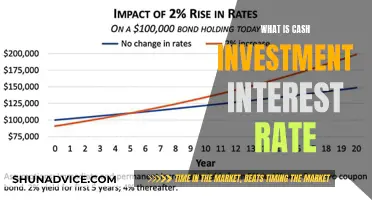
The Rule of 72 is a simplified formula that calculates how long it will take for an investment to double in value, based on its rate of return. The Rule of 72 applies to compounded interest rates and can be used to estimate the rate of return needed for an investment to double given an investment period. For example, if you wanted to double an investment in 5 years, you would divide 72 by 5 to get 14.4. This means you will need to earn 14.4% interest annually on your investment for 5 years for it to double.
| Characteristics | Values |
|---|---|
| Formula | R = 72 ÷ t |
| Formula variables | R = interest rate, t = number of years |
| Example | 72 ÷ 5 = 14.4% interest rate needed to double investment in 5 years |
| Accuracy | More accurate at around 8% interest |

The Rule of 72
To use the Rule of 72, divide 72 by the interest rate to see how long it will take to double your money on an investment. For example, if the interest rate is 6%, you would divide 72 by 6 to get 12. This means that the investment will take about 12 years to double with a 6% fixed annual interest rate.
Alternatively, you can calculate what interest rate you need to double your investment within a certain time period. For example, if you wanted to double an investment in 5 years, divide 72 by 5 to get 14.4. This means you'll need to earn 14.4% interest annually on your investment for 5 years for it to double.
Interest Payment: Invest, Operate, or Finance?
You may want to see also

Compounded interest rates
The Rule of 72 is a simplified formula that calculates how long it will take for an investment to double in value, based on its rate of return. The Rule of 72 applies to compounded interest rates and is reasonably accurate for interest rates that fall in the range of 6% and 10%. The Rule of 72 can be applied to anything that increases exponentially, such as GDP or inflation; it can also indicate the long-term effect of annual fees on an investment's growth.
To use the Rule of 72, divide 72 by the interest rate to see how long it will take to double your money on an investment. For example, if the interest rate is 6%, you would divide 72 by 6 to get 12. This means that the investment will take about 12 years to double with a 6% fixed annual interest rate.
The Rule of 72 can also be used to calculate what interest rate you need to double your investment within a certain time period. For example, if you wanted to double an investment in 5 years, divide 72 by 5 to learn that you'll need to earn 14.4% interest annually on your investment for 5 years: 14.4 x 5 = 72.
The Rule of 72 is a simplified version of the more involved compound interest calculation. It is an estimate and is more accurate at around 8% interest.
Structuring Simple Interest Investment Deals: A Comprehensive Guide
You may want to see also

Annual fees
The Rule of 72 is a simplified formula that can be used to estimate how long it will take for an investment to double at a given interest rate, assuming a fixed annual rate of interest. It can also be used to calculate the interest rate required to double an investment within a certain time period. For example, if you wanted to double an investment in 5 years, you would divide 72 by 5 to get 14.4. This means you will need to earn 14.4% interest annually on your investment for 5 years to double your money.
The Rule of 72 is reasonably accurate for interest rates that fall in the range of 6% to 10%. It is also more accurate at around 8% interest. This rule can also be used for inflation to estimate how many years it will take for your money's buying power to get cut in half.
When considering annual fees, it is important to note that they can impact the growth of your investment over time. Annual fees can reduce the overall return on your investment, especially if they are high relative to the size of your investment. It is important to carefully consider the impact of annual fees when choosing an investment option and to weigh the potential benefits against the costs.
Understanding S-Corp Basis Rules and Interest Expenses
You may want to see also

Inflation
The Rule of 72 is a simplified formula that calculates how long it will take for an investment to double in value, based on its rate of return. It can be used to estimate the interest rate needed to double an investment in a set number of years.
For example, if you wanted to double an investment in 5 years, you would divide 72 by 5 to get 14.4. This means you would need to earn 14.4% interest annually on your investment for 5 years.
The Rule of 72 can also be used for inflation. Just like with investment growth, you can divide 72 by the inflation rate (as a percentage) to estimate how many years it will take for your money's buying power to get cut in half. For example, if the inflation rate is 3%, it would take about 72 / 3 = 24 years for your money's buying power to be halved.
The Rule of 72 is an estimate and is more accurate at around 8% interest. It applies to compounded interest rates and is reasonably accurate for interest rates that fall in the range of 6% and 10%.
Monthly Interest Payments: Do Investments Reap Benefits?
You may want to see also

Investment period
The Rule of 72 is a simplified formula that calculates how long it will take for an investment to double in value, based on its rate of return. The Rule of 72 applies to compounded interest rates and is reasonably accurate for interest rates that fall in the range of 6% and 10%.
The Rule of 72 can be used to estimate the rate of return needed for an investment to double given an investment period. To calculate the interest rate required to double your money within a known time frame, you can use the formula: R = 72 ÷ t, where R is the interest rate and t is the number of years. For example, if you wanted to double an investment in 5 years, you would divide 72 by 5 to get 14.4. This means you would need to earn 14.4% interest annually on your investment for 5 years to double your money.
The Rule of 72 is a useful tool for estimating how long it will take for an investment to double at a given interest rate. It is important to note that the Rule of 72 is an estimate and may not be accurate for all interest rates. The rule is more accurate for interest rates around 8%.
Negative Interest Rates: Strategies for Smart Investing
You may want to see also
Frequently asked questions
You can use the Rule of 72 to calculate the interest rate required to double your money within a known time frame by solving for R: R = 72 ÷ t.
The Rule of 72 is a simplified formula that calculates how long it'll take for an investment to double in value, based on its rate of return.
The Rule of 72 is reasonably accurate for interest rates that fall in the range of 6% and 10%. It is more accurate at around 8% interest.







